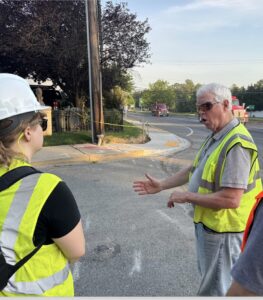A Game Changer For Maryland’s Roads and Drivers
Maryland State Highway Administration has authorized the use of recycled tire rubber in Maryland
In June 2025, the Maryland State Highway Administration placed a five-mile test project using rubber modified asphalt on the northbound lanes of Maryland Route 650 (New Hampshire Avenue) in Silver Spring, MD. While small in scale, the project marks a significant step forward in the state’s approach to infrastructure and sustainability.
“This new surface in Silver Spring, Maryland isn’t just fresh pavement—it’s a symbol of progress and partnership between industry and government,” TIA CEO Dick Gust said.
Through TIA’s ongoing advocacy efforts, the leadership of Maryland Delegate Kevin Hornberger, and the technical expertise of Red Clark, President of Asphalt Plus, the state has officially laid its first installation of rubber-modified asphalt (RMA)—a cutting-edge pavement material that incorporates recycled tire rubber into traditional asphalt to create longer-lasting, more environmentally friendly roads.
 In late 2023, TIA approached Delegate Hornberger with a vision: to incorporate rubber-modified asphalt into Maryland’s highway projects. The environmental and economic advantages were clear—RMA could extend the life of roads, reduce long-term maintenance costs, and repurpose scrap tires that might otherwise end up in landfills.
In late 2023, TIA approached Delegate Hornberger with a vision: to incorporate rubber-modified asphalt into Maryland’s highway projects. The environmental and economic advantages were clear—RMA could extend the life of roads, reduce long-term maintenance costs, and repurpose scrap tires that might otherwise end up in landfills.
Hornberger, a strong proponent of sustainable innovation, was immediately receptive. Over the winter months, he worked closely with TIA to develop legislation—House Bill 781—that would authorize and encourage the use of RMA by Maryland agencies.
As the 2024 legislative session got underway, TIA strengthened its advocacy by bringing in Red Clark, a nationally recognized expert in RMA. Clark met with lawmakers, conducted educational briefings, and testified in committee hearings, outlining the proven benefits of the technology in other states.
“The success seen to date is the product of years of effort that focused on all aspects of tire rubber-modified pavements, including scientific/engineering foundational work, extensive, successful use of the product in asphalt pavements nationally and internationally, demonstrated quality control in manufacturing, demonstrated continuity with various asphalt plant designs, functioning specifications and development of value propositions for technology use in a wide range of pavement designs,”Clark said.
Though HB-781 did not pass, the momentum behind it caught the attention of the Maryland Department of Transportation (MDOT). In the spring of 2024, MDOT invited Clark to meet with its engineering team, where he presented decades of performance data and examples of RMA success across the country. The result: MDOT took the initiative to develop a project-specific specification for RMA and began planning a pilot.
In July 2025, that pilot became reality.
“By incorporating recycled rubber and adding elasticity to the road, the lifespan of a road may be extended by 5 to 10 years. Rubber roads mean fewer cracks, reduced repairs, and thinner paving applications, leading to significant savings for Departments of Transportation (DOTs) and taxpayers,” U.S. EPA Mid-Atlantic Region Sustainability Coordinator, Luke Wolfgang said.
“Illegal tire dumping is a challenge in our communities, but using recycled rubber in road resurfacing offers a sustainable solution for keeping materials out of landfills, turning waste into a valuable resource for the circular economy and shaping the highways of the future,” he said.
EPA’s Wolfgang and a team that included Justin Short (ReMA-Recycled Materials Association, Director of Government Relations); Jeremy Baker (MDE- Maryland Department of the Environment, Government Relations); Bradley Baker (MDE – Program Manager, Resource Management Program); Sarah Hunt (MDE – Environmental Compliance Specialist, Scrap Tire Unit); Sara Weitzel (MDE – Natural Resources Planner) and Kitty McIlroy (President- Maryland Recycling Network) saw this in action during a July1 workshop tour, led by Asphalt Plus’ Red Clark , that began at the Pleasant Paving Company asphalt mix plant in Frederick, Maryland and culminated with the onsite rubber modified asphalt paving on MD 650.
Tire recycling is being transformed and paving the way in Maryland for improved road safety and fuel economy, reduced maintenance, wear on vehicles and tires and pavement rutting. Also, scrap tire rubber as a mix additive helps keep pavement prices stable, he said.
“This isn’t just a win for Maryland—it’s a roadmap for other states,” Gust said. “We’ve shown how the industry can work hand-in-hand with government to make meaningful change, from reducing scrap tire stockpiles to building better roads.” TIA continues to promote RMA adoption at both the state and federal levels. With the first Maryland project now on the ground, the association sees growing opportunity for other states to follow suit.
© Scrap Tire News, August 2025






